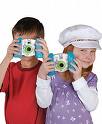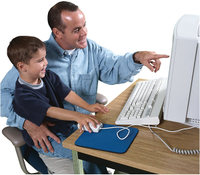|
Teach Photography Early On
It is never too early to teach photography to kids. Of course it will depend upon their age and development level. Once they are old enough to be aware that a camera takes a photo of something and will not just be mimicking your actions, you should be ready to go! These ideas can help you help them start off a great relationship with cameras. Take advantage of the new digital cameras designed especially for kids. Kodak, Vtech and Fisher Price all have durable and user friendly cameras for any budget. It might be time to move up the megapixel ladder yourself and use the old one so you will not care as much if it gets broken. (Besides, you never want your child to feel guilty and shy away from touching one again.) Your child shouldn't sense worry or fear when holding and playing with his or her first camera. Put a wrist strap on and make it fun to smile for the camera!
Now For More Quality Time!
With your camera's "view" or "playback" mode, whether as hooked up to your TV, downloaded onto your computer or simply viewed from the camera, take some extra time to sit with your child and go over the results. Listen to them as they review their work. Be very careful of potentially negative comments even when you don't intend to say them. "Oh, that looks like a ...." might not even be what they were trying to do. Ask questions and see what they would change if they took the shot again. Be careful not to step on a fragile ego. One flipant remark like "why did you take that photo?" can squash any enthusiasm and may be hard for them recover from without even knowing you did it. Do ask them to be selective with the photos. Get rid of most of them by letting them know that you can only save their favorites from each session. Learning to recognize what makes a good photo and why they might like one over another will help them reason and detach from some of their efforts with their first camera and help them strive for quality and not quantity. One day they will teach photography to someone they care about.
|
